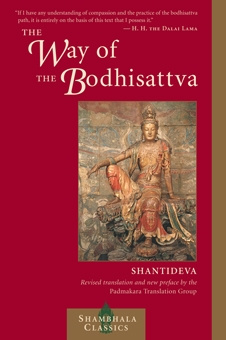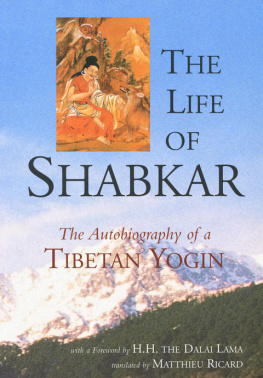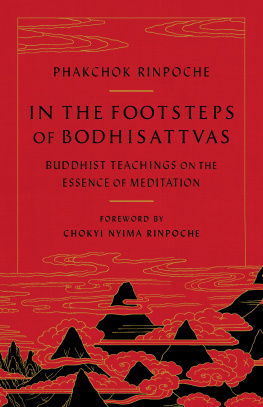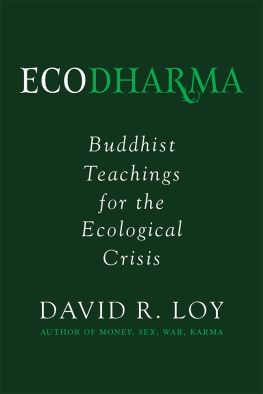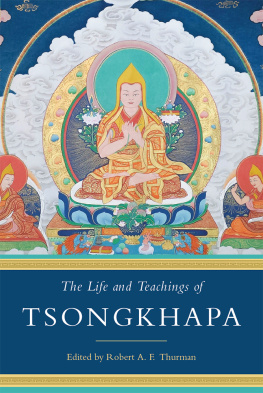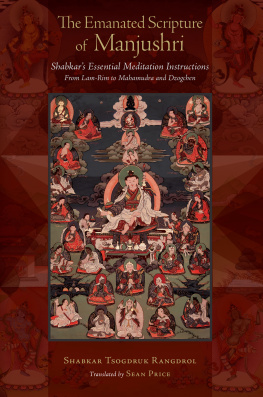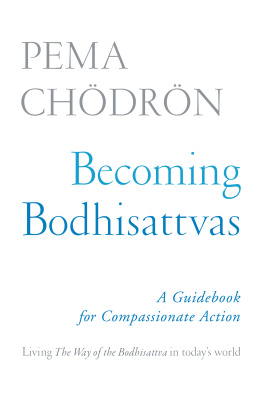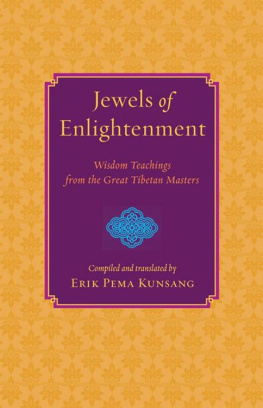Shabkar Tsogdruk Rangdrol - Food of Bodhisattvas: Buddhist teachings on abstaining from meat
Here you can read online Shabkar Tsogdruk Rangdrol - Food of Bodhisattvas: Buddhist teachings on abstaining from meat full text of the book (entire story) in english for free. Download pdf and epub, get meaning, cover and reviews about this ebook. City: China;Tibet Autonomous Region, year: 2011, publisher: Shambhala Publications, genre: Religion. Description of the work, (preface) as well as reviews are available. Best literature library LitArk.com created for fans of good reading and offers a wide selection of genres:
Romance novel
Science fiction
Adventure
Detective
Science
History
Home and family
Prose
Art
Politics
Computer
Non-fiction
Religion
Business
Children
Humor
Choose a favorite category and find really read worthwhile books. Enjoy immersion in the world of imagination, feel the emotions of the characters or learn something new for yourself, make an fascinating discovery.
- Book:Food of Bodhisattvas: Buddhist teachings on abstaining from meat
- Author:
- Publisher:Shambhala Publications
- Genre:
- Year:2011
- City:China;Tibet Autonomous Region
- Rating:5 / 5
- Favourites:Add to favourites
- Your mark:
- 100
- 1
- 2
- 3
- 4
- 5
Food of Bodhisattvas: Buddhist teachings on abstaining from meat: summary, description and annotation
We offer to read an annotation, description, summary or preface (depends on what the author of the book "Food of Bodhisattvas: Buddhist teachings on abstaining from meat" wrote himself). If you haven't found the necessary information about the book — write in the comments, we will try to find it.
Food of Bodhisattvas: Buddhist teachings on abstaining from meat — read online for free the complete book (whole text) full work
Below is the text of the book, divided by pages. System saving the place of the last page read, allows you to conveniently read the book "Food of Bodhisattvas: Buddhist teachings on abstaining from meat" online for free, without having to search again every time where you left off. Put a bookmark, and you can go to the page where you finished reading at any time.
Font size:
Interval:
Bookmark:
ABOUT THE BOOK
Based on the teachings of the Buddha, this book offers the most compelling and impassioned indictment of meat-eating to be found in Tibetan literature and is pertinent to anyone interested in vegetarianism as a moral or spiritual issue. The Buddhas teachings show how destructive habits can be examined and transformed gradually from within. The aim is not to repress ones desire for meat and animal products by force of will, but to develop heartfelt compassion and sensitivity to the suffering of animals, so that the desire to exploit and feed on them naturally dissolves.
There are two texts presented here. One is an excerpt from Shabkars Book of Marvels, consisting of quotations from the Buddhist scriptures and the teachings of masters of Tibetan Buddhism that argue against the consumption of meat, with Shabkars commentary. The second, the Nectar of Immortality, is Shabkars discourse on the importance of developing compassion for animals.
SHABKAR (17811851) was a renowned practitioner and teacher both of the Mind-Training and the Dzogchen traditions of Tibetan Buddhism. He was a free spirit who chose to live as a hermit or wandering pilgrim without home or possessions, far from the organized life of religious establishments. He left behind many volumes of teachings, including a celebrated autobiography. He is famous for his concern for animals.
The PADMAKARA TRANSLATION GROUP, based in France, has a distinguished reputation for all its translations of Tibetan texts and teachings. Its work has been published in several languages and is renowned for its clear and accurate literary style.
Sign up to learn more about our books and receive special offers from Shambhala Publications.

Or visit us online to sign up at shambhala.com/eshambhala.
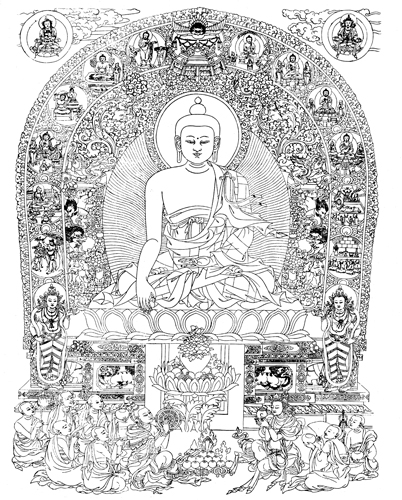
Buddha Shakyamuni
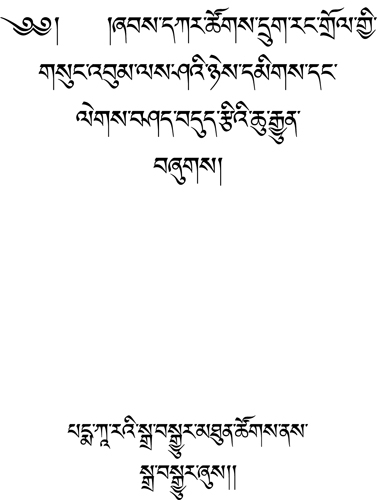
Food of Bodhisattvas
Buddhist Teachings on Abstaining from Meat

Shabkar Tsogdruk Rangdrol
Translated by the
Padmakara Translation Group

Shambhala
Boston & London
2011
Shambhala Publications, Inc.
Horticultural Hall
300 Massachusetts Avenue
Boston, Massachusetts 02115
www.shambhala.com
2004 by Padmakara Translation Group
Cover design by Graciela Galup
Cover art: Painting of Shabkar by Chgyal Rinpoche, 1989.
Photograph by Matthieu Ricard. Used with permission.
All rights reserved. No part of this book may be reproduced in any form or by any means, electronic or mechanical, including photocopying, recording, or by any information storage and retrieval system, without permission in writing from the publisher.
Library of Congress Cataloging-in-Publication Data
abs-dkar Tshogs-drug-an-grol, 17811851.
[Rmad byu sprul pai glegs bam. Sai es dmigs. English] Food of Bodhisattvas: Buddhist teachings on abstaining from meat/Shabkar Tsogdruk Rangdrol; translated by the Padmakara Translation Group.1st ed.
p. cm.
In English; translated from Tibetan.
Includes bibliographical references.
eISBN 978-0-8348-2410-2
ISBN 978-1-59030-116-6 (pbk. : alk. paper)
1. MeatReligious aspectsTantric Buddhism. 2. Tantric
BuddhismChinaTibetCustoms and practices. 3. abs-dkar Tshogs-drug-an-grol, 17811851. I. abs-dkar Tshogs-drug-an-grol, 17811851. Legs bad bdud rtsii chu rgyun. English. II. Padmakara Translation Group. III. Title.
BQ7610 .Z33 2004
294.3 5693dc22 2003026682
Contents


I am very happy that the Padmakara Translation Group has translated these wonderful texts. Lama Shabkar drew attention to the fact that animals, insects, and even shellfish are sentient beings, and because all of them cherish life and have feelings, they deserve to be respected just as human beings do.
If we Buddhistsespecially if we consider ourselves to be on the Mahayana pathwish to live according to the Buddhas teachings, then, as is said again and again in these texts, we must definitely avoid harming any living beings, whether directly or indirectly. This means that we must neither kill nor torture them ourselves, nor induce anyone else to do so.
When we enter upon the path of Dharma, we go for refuge in the Three Jewels, taking the Buddhas and Bodhisattvas as our witnesses. Repeating after the preceptor, we say, Taking refuge in the Dharma, I vow not to harm any living being. It is difficult to pretend not to know that we have said this, or to think that we can interpret these very clear words in some other way.
And so it is my wish that we may all develop love and compassion for all sentient beings, considering each of them as though they were our own dear children.
The Padmakara Translation Group gratefully acknowledges the generous support of the Tsadra Foundation in sponsoring the translation and preparation of this book.
P eople who know little about Buddhism but are fairly familiar with its teachings on nonviolence and compassion often assume that Buddhists are vegetarians. It is with surprise and sometimes a touch of disappointment that they discover that many (though by no means all) Buddhists, East and West, do in fact eat meat. Leaving aside the host of factors, private or social, affecting the behavior of individuals, the general attitude of Buddhists toward the consumption of meat has been conditioned by historical and cultural factors, with the result that attitudes vary from country to country. In their traditional setting, for example, the Mahayana Buddhists of China and Vietnam are usually strictly vegetarian. On the other hand, it is not uncommon for Japaneseand almost always the case for Tibetansto eat meat. And as Buddhism has spread to Europe, America, and elsewhere, it has seemed natural for new disciples to adopt the attitudes and practices typical of the tradition they follow.
Tibet was the one country in Asia to which the entire range of Buddhist teaching was transmitted from India, and Tibetans have, from the eighth century till the present, been deeply committed to the teachings of the Mahayana in both its sutric and tantric formsstudying, reflecting upon, and bringing into living experience its teachings on wisdom and universal compassion. It is well known, moreover, that these teachings and the attitudes they engendered on the popular level exerted a powerful influence on the relationship between the Tibetans and their natural surroundings. European visitors to Tibet and the Himalayan region before the Chinese invasion were often struck by the richness and docility of the wildlife, which had become fearless of human beings in a country where hunting was rare and universally condemned. Yet the fact remains that Tibetans in general have always been, and still are, great meat eaters. This is mainly due to climate and geography, since large portions of the country lie at altitudes where the cultivation of crops is impossible.
Long habit, of course, gives rise to deep-seated predilection and, despite their religious convictions, many Tibetans living in other parts of the world have not changed their diet. This, in itself, is not very surprising. It is difficult for everyone to abandon the habits of a lifetime, and one of the first impulses of travelers and immigrants the world over is to import or procure their own kind of food. In any case, like the rest of humanity, many Tibetans find meat delicious and eat it with relish. But if this was and is the norm, both in Tibet and among Tibetans in exile, the daily practice of the Mahayanaconstant meditation on compassion and the Bodhisattvas commitment to liberate all beings from their sufferingsinescapably calls into question the eating of meat. As a rule, Tibetan Buddhists, even confirmed meat eaters, are not insensitive to this. Many freely admit that the consumption of a food indissociable from the intentional killing of animals is less than ideal and is unsuitable for Buddhist practitioners. Many Tibetans make the effort to abstain from meat on holy days and at certain sacred seasons of the year. Many express an admiration for vegetarianism; and it is rare to find Tibetan lamas who do not praise and advocate it for those who are able, even if, for whatever reason, the lamas consume meat themselves.
Next pageFont size:
Interval:
Bookmark:
Similar books «Food of Bodhisattvas: Buddhist teachings on abstaining from meat»
Look at similar books to Food of Bodhisattvas: Buddhist teachings on abstaining from meat. We have selected literature similar in name and meaning in the hope of providing readers with more options to find new, interesting, not yet read works.
Discussion, reviews of the book Food of Bodhisattvas: Buddhist teachings on abstaining from meat and just readers' own opinions. Leave your comments, write what you think about the work, its meaning or the main characters. Specify what exactly you liked and what you didn't like, and why you think so.

